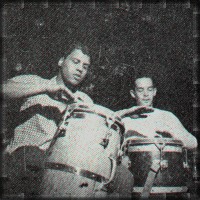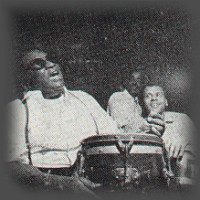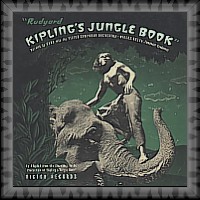 |
Who was Sabu? |
| b. 7/14/30 | Louis "Sabu" Martinez was born July 14th, 1930 in New York City's El Barrio (Spanish Harlem). As a youth he got into all sorts of trouble but also banged on cans in a street band. His professional career began at age 11, when he began playing Latin percussion for reknowned mambo and jazz bands, touring. In 1944 he returned from Puerto Rico to New York, where he continued to play in famous bands and develop his technique. |
| Chano Pozo and others | Sabu claimed the Lecuona Cuban Boys as major influences as well as the legendary Chano Pozo. In 1948 Sabu replaced Pozo in Dizzy Gillespie's last big band; the baton of Afro-Cuban jazz drumming literally was passed to Sabu. He joined Benny Goodman the following year. Other mentors were his friends Art Blakey, with whom he was associated from 1949 to 1958, Arsenio Rodriguez, and Candido. He was a member of the original Joe Loco Trio, which recorded the first mambo in America. He performed in Broadway's "House of Flowers" and with other luminaries such as Xavier Cugat, Tony Bennett, and Sammy Davis, Jr. |
| Blue Note and Blakey | From 1953 to 1957, Sabu recorded with Art Blakey, memorably leading a rhythm section on the fantastic Orgy in Rhythm session. The Blakey/Sabu recordings showcase the interplay of two master drummers and successfully pair both African and [African-derived] Latin rhythms. They provide convincing renditions of traditional African as well as improvisational tunes and motifs, complete with gongs, wild cries, and authentic Swahili chants. |
| First quintet and exotica | Sabu formed his own quintet in 1957 and recorded three exotic classics: Palo Congo for Blue Note, Safari for RCA, and Sorcery for Columbia. While not masterpieces of jazz, Safari and Sorcery easily are the strangest, most powerful recordings in the dubious "exotica" idiom. Eerie jazz soloing, Sabu's "avalanche" of percussion, and unusual effects such as extremely weird bird shrieks guarantee a unique and unforgettable listening experience. |
| Down and back up | Like many jazzmen in the late 1950s, Sabu struggled with heroin addiction, which took its toll on him as on all of jazz. He took odd jobs and even left music for a time, at one point running a strip joint on Baltimore's famous "Block." But with the help of friends he landed new gigs. In 1960 his fifteen minutes of real fame arrived. He joined Louie Ramirez briefly to record the masterpiece of Latin jazz, Jazz Espagnole. |
| Family | More work as a sideman followed. Sabu spent the early to middle 1960s in Puerto Rico (where he was involved in a Sammy Davis, Jr. film). He married and moved to Sweden permanently in 1967. Over the years he married several times and had many children. At least two sons, Rene and Johnny, are drummers. (One later played in the Swedish band "Hot Salsa," and several members of the family perform on 1973's ultra-funky Afro Temple.) |
| Sweden | Sabu recorded, performed, and gave instruction throughout the 1960s and '70s. He played with the Radio Jazz Group of Stockholm and on many Scandinavian and European jazz, Latin, big band, fusion, and funk records. In 1973 he formed the group New Burnt Sugar and published a book of conga exercises. Life was not always easier, however; at one point Sabu had to move because of racist hostility. |
| d. 1/13/79 | Sabu died January 13, 1979, of a gastric ulcer. He was neither the first nor the last jazz-conga virtuoso, but he may well have been the best. Certainly he led an exciting life and was in most of the right places at the right times. Fortunately he left behind an incredible variety of unique, important, and truly excellent records. |
 | With Whom Did Sabu Play? |
| Colleagues -- Sabu played with many of the greatest names in jazz, Latin, and popular music. Several are listed below. (See also the personnel listings for each of the recordings listed in the discography.) | |
| |
Anecdotes -- "Sabu was living in Los Angeles, playing with different bands but not making much money. One day he borrowed my spare conga set. I asked him, "Where is yours?" and Sabu replied that he sold his set to leave money for his children because he was going out of town (in Spanish: "las vendi para dejar habichuelas para mis hijos"). "Two days later, I was in Las Vegas, trying to get a gig in a new casino. The line was endless, but I heard the stage manager clearly call his name: "Louis Martinez, you are next..." Suddenly, Sabu leaped to the center of the stage and started singing, "El Cumbanchero!!!" He was trying to get hired as a singer because he had sold my congas to pay for the bus to Las Vegas!" -- Francisco Aguabella, as told to George Bonilla "Sabu moved to Puerto Rico in 1964. His first major perfomance here was with the Johnny Conquet Orchestra at the San Geronimo Hilton, Dec. 1, 1964. I had the honor of being the drummer with that band. I met Sabu the same day we started. We had a short jam session in the afternoon to "get the feel," and in the evening we started at 8:00 p.m. "We had a lot fun playing together. We also played with one of the best Cuban female singers in those days, Olga Guillot. Sabu spent many years in Puerto Rico playing with many local jazz groups as well as show bands. I will always remember him." -- Joe "Fino" Olivencia | |
Sabu was not:
| |
 |
Dizzy Gillespie nicknamed Sabu after the famous star of such films as Cobra Woman, Thief of Bagdad, and, ironically, Drums. That Sabu --the East Indian "Elephant boy"-- narrates the Jungle Book soundtrack (RCA Victor, 1942). It was the first American-made feature film to have its score, by Miklos Rozsa, recorded for commercial release as an album. Originally a set of three 78 rpm records on Victor and Alco, it was reissued by Entracte on a 1979 LP. |
Discography___ Interviews___ Obituary | |
 |
 |
© 1997 Hip Wax